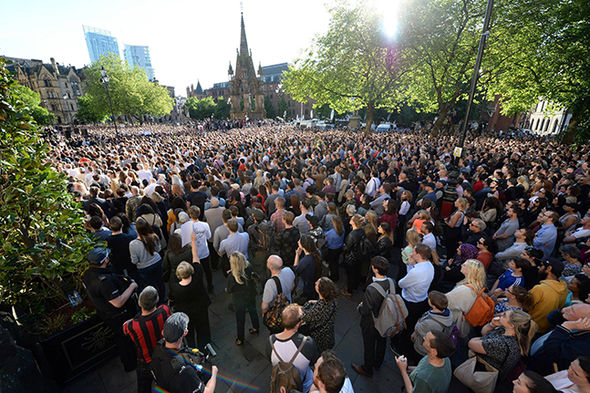Thursday
In what has become a grim tradition for this blog, I run the same post, slightly amended, whenever we have another major mass killing in the world. Today we mourn the victims of the Manchester suicide bombing.
I have had to add the qualifier “major” since if I included those mass killings where the victims number “only” in the single digits, I would run this post continually. The same would be true if I included mass killings in war zones, such as Syria.
My major go-to work on these occasions is Beowulf. Few works of literature capture so powerfully the social violence that strikes from within, especially in the poem’s depiction of the resentment-crazed Grendel. If Salman Abedi fits the profile of previous Grendels, it will emerge that he nursed “a hard grievance” and saw others partying in the Great Hall while he felt left out.
Invoking Beowulf for a Manchester tragedy may be particularly appropriate in this case as the poem was composed in northern England. (Beowulf has traces of various northern Anglo-Saxon dialects.) Here’s the passage of King Hrothgar helplessly surveying the devastation and feeling incapable of doing anything about it. It doesn’t matter that Denmark, like the United Kingdom, is a powerful nation. The inability to prevent such violence can give rise to crippling self doubts:
So Grendel ruled in defiance of right,
one against all, until the greatest house
in the world stood empty, a deserted wallstead.
For twelve winters, seasons of woe,
the lord of the Shieldings suffered under
his load of sorrow; and so, before long,
the news was known over the whole world.
Sad lays were sung about the beset king,
the vicious raids and ravages of Grendel,
his long and unrelenting feud,
nothing but war…
All were endangered, young and old
were hunted down by that dark death-shadow
who lurked and swooped in the long nights
on the misty moors; nobody knows
where these reavers from hell roam on their errands.
The Bewulf poet writes that “these were hard times, heartbreaking for the prince of the Shieldings.”
Fortunately, the people of Manchester, at least so far, are standing together, determined not to let such monstrosity sow internal divisions. The way to confront terrorism is with fierce resolve, symbolized by Beowulf’s iron grip:
The captain of evil discovered himself
in a handgrip harder than anything
he had ever encountered in any man
on the face of the earth. Every bone in his body
quailed and recoiled, but he could not escape.
He was desperate to flee to his den and hide
with the devil’s litter, or in all his days
he had never been clamped or cornered like this.
Beowulf doesn’t kill Grendel because Grendel is the archetype of a hatred that can’t be killed. Murderous resentment seethes continually within societies, and Abedi is just the latest vessel that the hatred has possessed. When the community stands strong against the hatred, however, it panics and falls apart: faced with Beowulf’s strength of will, Grendel rips himself free of his arm and flees to a dark place.
Our hearts are with you, Manchester. Be Beowulf strong.
Previous Posts on Mass Killings
This Time Grendel Chose Umpqua
Pennywise Kills North Carolina Muslims
Grendel as a Norwegian Christian Fascist
Dostoevsky and the Arizona Shootings
Lost Paradise Syndrome in Tucson
Satan Strikes Again, This Time in Aurora
Grendel’s Invasion of Fort Hood
A Modern Grendel on the Rampage
